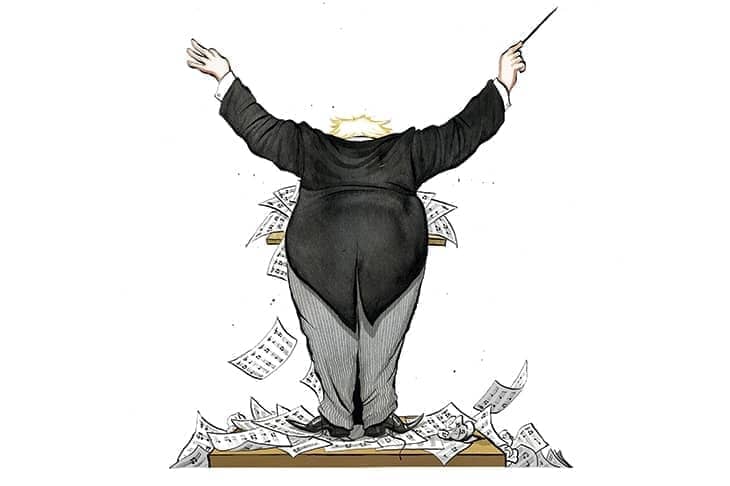Labour spin doctors this morning whisked Keir Starmer to the scene of his party’s biggest gain in the north in order to provide the TV networks with pictures of him celebrating victory. They took him to Barnet. That’s Barnet, North London. For that’s how far the red tide ran last night. It couldn’t even sweep over nearby Hillingdon, the borough that contains the Prime Minister’s parliamentary seat.
And though Starmer told his activists in strangulated, overly-urgent tones that Labour had also won in Cumberland, where a new unitary council was having its first election, the list of other gains he recited – Wandsworth, Westminster, Southampton – made the point that the Red Wall had not fallen into his lap. Far from it. Labour was actually this morning on track to record a modest loss of council seats outside the capital.
The idea that the Conservatives cannot stay in power if Johnson is still at the helm has taken a battering
Even in the capital what we saw in the main was the continued progression of demographic trends that have been helping Labour for 20 years: a higher proportion of voters from ethnic minority groups with Labour-voting traditions, millions of EU citizens voting and the gradual exit of culturally conservative, lower-middle class English voters to provincial towns.
All of this leaves those Conservative MPs who had expected to be able to use the local election results as a launchpad for a new plot to unseat Boris Johnson in a quandary.
After all the panic and scandal, with living standards dropping like a stone and some pundits claiming Partygate had turned the Boris brand toxic in the vital Red Wall seats won in 2019, what we saw was a case of bog standard, mid-term blues.
This isn’t to say Partygate had no effect. In Sunderland, where a recent pattern of Tory gains stalled, the Conservative group leader Antony Mullen was clear that the furore had suppressed turnout among voters who had previously been leaning the party’s way.
But two years out from a general election and with Starmer also now mired in allegations about lockdown beer and curry, the idea that the Conservatives cannot stay in power if Johnson is still at the helm has taken a battering.
Tory parliamentarians may decide that there is still an overwhelming ethical case for dumping Johnson, especially if he gets another fixed penalty notice when the Metropolitan Police rules on the legendary ‘Abba party’ in the Downing Street flat. But there is clearly no such overwhelming electoral case, especially in the absence of an obvious replacement guaranteed to push the Conservative poll rating upwards.
National opinion polls that currently show Labour averaging 40 per cent, with the Tories six points back on 34, have been broadly reflected at these local polls.
That’s far from a disastrous position for a party that has been in government for 12 years to find itself in, especially after the media battering of the past six months. The obvious lack of any visceral positive connection established by Starmer and his party with Red Wall voters speaks volumes.
For those Tory MPs who have been sitting on the fence about the Prime Minister’s future while they work out what is in their own long-term interests, sticking with Boris now looks a far safer bet than toppling him in the hope that a replacement will be able to sustain the electoral coalition he has forged.
Partygate has not quite proven a case of ‘sound and fury signifying nothing’, but it is a medium-sized disadvantage that is shrinking before our eyes. The next election is there to be won for the Conservatives if they can deliver on the economy, migration control and the NHS. It is hard to see how the death of a salesman would help matters along.







Comments